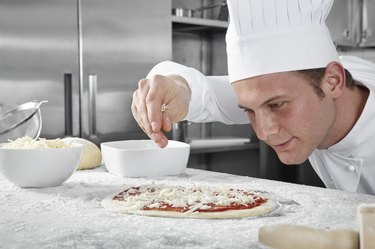
Americans love their pizza. On any given day, one out of every eight Americans enjoys a slice, according to the Agricultural Research Service. A slice of Sicilian pizza is not like a slice of traditional cheese. Sicilian pizza has a thick crust and is square or rectangular. It also has a different nutritional profile than traditional pizza and may be higher in calories, fat and sodium.
Whoa! Watch Those Calories
Video of the Day
One slice of Sicilian cheese pizza, which is one-sixteenth of a whole sheet, contains 486 calories. By comparison, a slice of cheese pizza from a 14-inch pie contains 285 calories. It is important to note that calorie content in pizza, both Sicilian and traditional, varies depending on who makes it. But having an idea of the number of calories in a typical slice may help you keep track of your intake for better weight management.
Video of the Day
High in Unhealthy Fat
This may come as no surprise considering the cheese, but Sicilian pizza is high in fat and saturated fat. One slice contains 20 grams of total fat, 8 grams of saturated fat and 46 milligrams of cholesterol. The American Heart Association recommends you limit your intake of saturated fat to less than 7 percent of calories, or no more than 16 grams a day on a 2,000-calorie diet. In addition, the association advises you to limit total cholesterol to less than 300 milligrams a day. If you eat 2,000 calories a day, one slice of Sicilian cheese pizza will account for 50 percent of your recommended daily saturated fat limit and 15 percent of your daily cholesterol limit.
A Look at the Carbs and Protein
A slice of Sicilian pizza is also high in carbs and protein. One slice contains 53 grams of carbohydrates and 24 grams of protein. For perspective, one slice of the pizza has about the same amount of carbs as three slices of bread, and it meets about half your daily protein needs. While carbs and protein are nutrients your body needs to function properly, the sources in the pizza -- white flour for carbs and cheese for protein -- are not the healthiest.
Too Much Sodium
Most Americans get too much sodium in their diets, says the heart association. Too much sodium increases the risk of high blood pressure, which is a leading risk factor in the cause of death in women. For heart health, the association suggests that you limit sodium to less than 1,500 milligrams a day. One slice of Sicilian cheese pizza meets two-thirds of an entire day's worth of sodium with 1,015 milligrams. By comparison, a slice of regular cheese pizza contains 640 milligrams of sodium.
Vitamins and Minerals
Sicilian pizza may be high in fat and sodium, but it is an excellent source of calcium and a good source of vitamin A and iron. One slice of the pizza meets almost 50 percent of the daily value for calcium, 11 percent of the daily value for vitamin A and 18 percent of the daily value for iron. Getting enough calcium is important for bone health, iron helps build red blood cells and vitamin A is important for healthy skin and mucous membranes.
- Agricultural Research Service: Consumption of Pizza
- Pizza Today: Sicilian Pizza
- Mount Holyoke College: Nutrition Facts: Sicilian Cheese Pizza
- USDA National Nutrient Database for Standard Reference: Fast Food, Pizza Chain, 14", Cheese Topping, Regular Crust
- American Heart Association: Know Your Fats
- American Diabetes Association: Carbohydrate Counting
- Centers for Disease Control and Prevention: Protein
- McKinley Health Center: Macronutrients: The Importance of Carbohydrates, Protein and Fat
- American Heart Association: The Effects of Excess Sodium in Your Health and Appearance
- MedlinePlus: Vitamin A
- Utah State University: Nutrients: Minerals